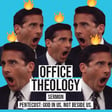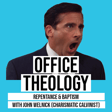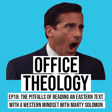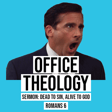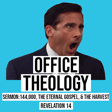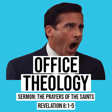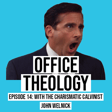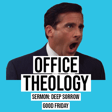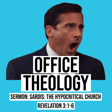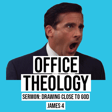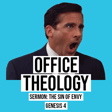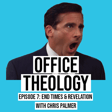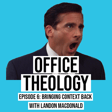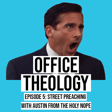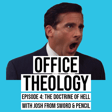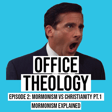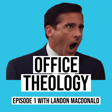Become a Creator today!Start creating today - Share your story with the world!
Start for free
00:00:00
00:00:01

Episode 3: Pt. 2 of Mormonism vs. Christianity (Theological Differences)
Part 2 breaks down the theological differences between Mormonism and Christianity.
Topics Covered:
- Triune God
- Father, Son & Spirit
- Sin
- Human Deification
- Eternity
- Garments
- Eternal Marriage & Sealing Rituals
Transcript
Introduction and Podcast Overview
00:00:01
Speaker
It's not easy to communicate the true gospel to LDS friends. It's not. It's really hard. There's spiritual and relational forces that make them among the toughest to reach in our community. But at the very least, what we can do is point out the differences to show that they are in fact not the same thing as Christians. We have the same words, but drastically different definitions.
00:00:24
Speaker
All right, well, welcome back to Office Theology Podcast. This is part two of the hot take Mormonism versus Christianity. This episode breaks down the theological differences. If you missed part one, go back and listen to that first. The entire focus of that episode is explaining Mormonism.
Source Validation of LDS Quotes
00:00:42
Speaker
And just a way of clarification, these two podcasts are overviews of Mormonism and the theological differences. I could probably spend 10 plus episodes on this, but I hope this encourages you to go do more research to dive deeper. So once again, this is an overview. So just a disclaimer once again.
Host's Background and Objectives
00:01:02
Speaker
All of the quotes that I have about LDS are coming from their website, ChurchofJesusChrist.org, and some other LDS-backed websites like BYU Forms, different things like that. I have no interest in proof texting. To prove my points, it's not really necessary at all.
00:01:18
Speaker
So lastly, I just want to put the goal of this podcast or this conversation up front right away. If you're LDS and listen to this episode, I'm so glad that you're here. I honestly am. I grew up LDS and a lot of people think that I'm doing this because I had a bad experience or I have a chip on my shoulder.
00:01:36
Speaker
I don't have that at all. The reality is I had a great experience growing up LDS. I made a lot of really good friends, had really good memories, but just because I had a good experience does not mean what the LDS Church teaches as true. And so that is not why I'm doing this. I have been a Christian.
00:01:54
Speaker
I would say Orthodox Christian because then you're going to argue with that for the last 13 years. I have a huge heart and desire to bring some clarity to this conversation and these definitions. So my goal isn't necessarily to convince you of what I'm saying, but to show you the differences between the two and let you analyze what is being presented.
Defining Terms: Jesus and the Triune God
00:02:14
Speaker
So that even if you reject what I am saying, you can't help but see that in fact, Christianity and Mormonism is not the same, same thing by definition. Yes, we say the same words, but no, we do not mean the same things by that. Or do we get to those same words the same way? So it's really important for me that at least you look at this and be like, okay,
00:02:36
Speaker
I may be LDS and I may be Mormon, but that is not the same thing as being a Christian or an Orthodox Christian. And so I just want to make sure that is up front because that's the goal of this, just to present the facts and allow you to wrestle with those. Now, I could spend several episodes on these topics, but once again, this is an overview of these specific doctrinal differences.
Contrasting Beliefs: The Trinity
00:02:58
Speaker
The first one we need to start with is the conversation of the Triune God, or as Orthodox Christians would call it, is the Trinity. LDS beliefs are this.
00:03:10
Speaker
LDS Church rejects the Jesus Christ of the Christian Orthodoxy in that they believe that God the Father is greater than Jesus. They believe in a sort of a Trinity because they believe that there are three members in the Godhead, but they are three distinct beings and separate gods. In Mormon thought, this is from the Doctrine and Covenants, God has a physical body. The Father has a body
00:03:33
Speaker
of flesh and bones as tangible as man's and the Son's also. But the Holy Ghost has not a body of flesh and bones, but is a person of spirit." So the Christian belief around the Triune God is this. Christian Orthodoxy states that there is one God who eternally exists as three distinct persons.
00:03:54
Speaker
God the Father, God the Son, and God the Spirit.
LDS View of God the Father
00:03:58
Speaker
Although each member of the Trinity serves a different function, they each possess equal power and authority. But Mormons do not believe in the accepted view of Christ of the Trinity that is co-eternal, co-equal with God the Father and the Holy Spirit in the triune Godhead. And I've had many conversations with
00:04:20
Speaker
Um, some LDS people on our Instagram and you're might even be listening to this, but, uh, one person said it this way goes, it seems like, except for the triune God thing, we all believe the same thing about Jesus. Yeah. At a face value. Absolutely. We believe the same thing. If you mean by same thing, the same words, but.
00:04:42
Speaker
If I say Jesus is God and you say Jesus is not God, then we're talking about two different people. We're not talking about the same person. So although the language may be similar or familiar, it is not the same thing. And that's where having conversations with people of LDS faith is so confusing as a Christian. And if I remember going back to all the polls that I did, I believe it was 68% of Orthodox Christians,
00:05:06
Speaker
said they would not know how to explain the differences between when an LDS person says Jesus and when a Orthodox Christian says Jesus. So I hope that this podcast, this conversation, will bring some clarity and some points for you to be able to bring up. All right, next, out of the Trinity conversation, the first one, or the Triune God, the first one we're going to say is Father.
Differences in Beliefs about Jesus
00:05:28
Speaker
For LDS beliefs, it is good to note that when Mormons say God, they mean the Heavenly Father, not God in the Christian Orthodox sense of the triune God like we just explained. Brigham Young once remarked, see, there was a long progression of gods and fathers leading up to our Heavenly Father. How many gods there are, I do not know. But there never was a time when there were not gods and worlds. What is clear,
00:05:53
Speaker
is that the Mormon God is not a higher order or a different species than man. God is a man with a body of flesh and bones like us. Lorenzo Snow, the church's fifth president, coined a well-known couplet, as man is now, God once was. As God is now, man may be. So they believe that God was a man just like us and became God, and so therefore we can as well, which we'll talk about eternal progression in a little bit here.
00:06:24
Speaker
And this one is where it gets, gets a little more wild. And so the belief that God is married is unique to Mormonism. Now, if you're LDS, listen to this and you're like, no, that's not true. Hold on. This is from your website. If you think I'm making this up, just go to your website under gospel topic essays and you will see this. And this is a direct quote.
00:06:45
Speaker
The Church of Jesus Christ of Latter-day Saints teaches that all human beings, male and female, are beloved spirit children of heavenly parents, a heavenly father and a heavenly mother. This understanding is rooted in scriptural and prophetic teachings about the nature of God and our relationship to deity and the godly potential of men and women.
00:07:06
Speaker
The doctrine of a heavenly mother is cherished in distinctive belief among LDS. It continues on saying men and women cannot be exalted without each other. Just as we have a father in heaven, we have a mother in heaven. As Elder Dallin H. Oaks of the Quorum of the Twelve Apostles had said, our theology begins with heavenly parents and our highest aspiration is to be like them.
00:07:31
Speaker
And it continues on to say, men and women cannot be exalted without each other. Just as we have a father in heaven, we have a mother in heaven. As Elder Dallin H. Oaks of the Quorum of the Twelve Apostles, he said, our theology begins with heavenly parents. Our highest aspirations is to be just like them. And once again, if you think I'm making this up, just go to your website.
00:07:53
Speaker
under gospel topics. It's called the heavenly mother and you can read all about it. And what I'm trying to do is this is like, I have no interest in trying to prove my point by representing things falsely. I have zero interest in that because I honestly don't think I need to do that. What I'm trying to do
00:08:10
Speaker
is to show you that Christianity and Mormon is not the same thing.
LDS Salvation vs Christian Salvation
00:08:15
Speaker
Like you can't say, well, they're basically the same because the deeper you dive, the further away from each other they are. And so I know if you're listening to this, like, well, Brennan,
00:08:27
Speaker
Joseph Smith is the start of the restoration, as the LDS would call it, the one true church. And that all their churches, they would call Christianity mainline Christianity, which has veered away from the true teachings. And I say this in quotes, the true teachings of Jesus Christ, but the reality is
00:08:46
Speaker
You did not redefine Christianity. Joseph Smith is not the one who came in all of a sudden at the last second. He was the one that saved the Christian faith. No, it has been around. It has been faithfully growing as is. But to call that Mormonism and Christianity basically the same thing, I think an accurate thing would be is to say this. Christians and Mormons basically say the same things, but they do not define those things the same way.
00:09:15
Speaker
The Christian belief about God the Father is this. He is the first person in order among the members of the Trinity. Neither the Son or the Holy Spirit is ever mentioned as being first in order. This does not mean that the Father is greater than the other two members. While He may be first in position, they are equal in character. God the Father is all-powerful, all-knowing, ever-present, unchanging,
00:09:37
Speaker
completely worthy of our trust, and above all, He is holy. It is in Him that we live, move, and exist. God is good. He is our perfect Father, loving, compassionate, and faithful to His people and His promises." And I know I could expound on God the Father for much, much longer. But remember, to keep this episode relatively shorter in time, we're going to do overviews.
00:10:05
Speaker
All right, so now let's jump to the person of Jesus. LDS believe this, that Jesus was simply the firstborn of God and thus the elder brother to all humanity. They believe Jesus reached his pinnacle when he was ranked as a God and became the creator and infinite savior.
00:10:21
Speaker
Mormons believe that prophets such as Jesus and Joseph Smith are quote, men like us, but that they have been authorized and empowered to share the word of God. So this next paragraph is going to sound awfully familiar. So just brace yourself for a moment.
00:10:37
Speaker
Mormons believe Jesus is the Redeemer, God, and Savior. He is endless and eternal, the only begotten Son of the Father. Through Jesus, the Heavenly Father is provided a way for people to be like Him and live with Him forever.
00:10:53
Speaker
Oh boy. So this is why it is so confusing to have conversations with people of the LDS faith. Cause you listen to that. You're like, yeah, okay. We're speaking the same language. Sure. But like we've been saying, not defining that language the same way, but this familiar language does not mean the same thing to Mormons as it does Christians. This is what Mormons believe. Jesus was born of the father, just like all spirit children. God is his father in the same way that he's the father to all.
00:11:23
Speaker
Whatever immortality and godhood Jesus possesses, they are all inherited attributes and powers. He does not share the same eternal nature as the Father. Jesus may be divine, but he is a derivative of divinity. Mormon theology teaches, in the words of Joseph Smith, that Jesus Christ is God the second, the Redeemer.
00:11:46
Speaker
And so this kind of, this is what I have to fight in this conversation, to go down so many different rabbit holes about many sentences that I'm reading. So this rabbit hole that I want to go down for just a minute is an essay or a conversation by Brigham Young preparing for eternal progression. This is what he says. We are placed on this earth to prove whether we are worthy to go into the celestial world, terrestrial world,
00:12:13
Speaker
or the celestial world or hell or any other kingdom or place. We have enough of life given to us to do this. So basically saying this life you will prove if you are worthy of going to which world or which level of eternity or which level of heaven. And so we'll jump into the levels of heaven in just a moment. Listen to the language of worthy improving. The second piece I want to read is this. This is a world in which we are to prove ourselves the lifetime of a man
00:12:41
Speaker
is a day of trial wherein we may prove to God in our darkness, in our weakness, and where the enemy reigns that we are our father's friends and that we receive light from him and are worthy to be leaders of our children and become lords of lords and king of kings, to have perfect dominion over that portion of our families that will be crowned in the celestial kingdom with glory, immortality, and eternal lives.
Jesus' Role in Salvation
00:13:09
Speaker
That paragraph there is saying that we are proving ourselves in this world so that we could become the Lord of Lords, the King of Kings and dominion over our families in a specific part of the celestial kingdom. Okay, so let's keep reading. This is the final piece that I want to read from it. This is kind of where he's ending and landing the plane in this conversation. He says, hear it.
00:13:34
Speaker
All ye Latter-day Saints, will you spend the time of your probation for naught and fool away your existence and being? You are organized and brought into being for the purpose of enduring forever. If you fulfill the measure of your creation, pursue the right path, observe the requirements of the celestial law, and obey the commandments of our God.
00:13:57
Speaker
Okay, so if we're talking about Jesus and his sacrifice has paved the way for all of us and they say they believe that Jesus is the one who brings about salvation and he's the one that atones for our sins, then how come all this extra stuff? If salvation is a free gift that comes from the finished work of Jesus,
00:14:18
Speaker
not Jesus, plus a bunch of imposed burdens that the LDS put on their followers. Now I'm not advocating, so calm down for no works. James, the book of James doesn't leave that up for debate, but our works don't produce salvation, especially a quote, salvation with tears of heaven. We'll dive into eternity in a bit, but what really like
00:14:39
Speaker
annoys me about this. If you have to do all these extra things in addition to what Jesus has done on the cross, then why did Jesus really have to die on the cross? He just has become a piece in this conversation, but really eternity is on you.
00:14:59
Speaker
No, no, we are no match for being made right with God. It is through the free gift of grace through Jesus Christ. That is the only way we can enter into heaven. That is the only way we can receive this free gift of salvation, which goes into the Christian belief is this.
00:15:18
Speaker
Jesus is completely human, but at the same time completely God. He is the only plan for bringing people far from God back into right relationship with the Father. Jesus lived a perfect life so that he could be the substitution for us in satisfying God's demands for perfection.
00:15:37
Speaker
Now listen, He received a punishment for our sins when He died on the cross, satisfying God's wrath and defeating death in His resurrection so that we all could have life. You see, Jesus wasn't a man that achieved godhood through eternal progression. He was already God.
00:15:55
Speaker
And so God had to come Emmanuel God with us. God came to earth and in the form of Jesus, He's the visible image of the invisible God. And this is what fires me up about this is like when LDS say Jesus and an Orthodox Christian says Jesus, it's not even close to the same thing. Sure, it's the same name.
00:16:22
Speaker
But the Jesus that the LDS church sells is one of a man who became a little G God and has some power, but not complete power. Because if it's on you in your lifetime now to do all the right things, just right, to enter the highest level of heaven,
00:16:52
Speaker
Okay, so then why did Jesus even had to die?
The Holy Spirit: LDS vs Christian Beliefs
00:16:56
Speaker
It's like Jesus, the LDS cell that it's like Jesus plus all of your works and all of your effort. Now I'm not opposed to effort, I'm not. But my effort isn't gonna produce salvation. And if you're LDS listening to this, you know the weight that I'm talking about. It's Jesus plus all of your effort and righteous attempts.
00:17:22
Speaker
So would you come and would you choose the Jesus that offers this gift of salvation for free, not the one who says it's me plus all of your effort and your works and your righteousness, because our righteousness are nothing compared to Jesus' finished work. Now let's jump to the third piece.
00:17:43
Speaker
The Holy Spirit, they believe the Holy Spirit is not God and does not have a physical body, but it is a spirit that is in perfect unity with Jesus and the heavenly Father to, as it says in 2 Nephi, witness of the Father and the Son, and to reveal the teaches of the truth of all things, as it says in Moroni. The Christian belief is this.
00:18:07
Speaker
Third person of the Triune God is God the Spirit. He's not a spirit, he is the Spirit. He's the Spirit of God. The presence of the Holy Spirit assures us of our relationship with Christ, guiding believers into all truth and exalting Christ. He convicts people of sin, reminds us of God's righteousness and the coming judgment. He's also our comforter, the giver of spiritual gifts, and empowers us to witness boldly and make us more like Christ.
00:18:34
Speaker
Once again, these definitions sound so similar, but it's missing one huge piece. LDS don't believe that the Holy Spirit is God. So when we say we're basically saying the same thing, no, no, we are not. We cannot basically be saying the same thing and have completely different definitions.
Human Deification and Eternal Progression
00:18:52
Speaker
The only thing that we have in common is we're using the same words. This next piece that I want to dive into
00:18:59
Speaker
is a fun one. It's human deification. So this is LDS beliefs.
00:19:05
Speaker
So in a recent study, three, four, some Mormons surveyed a belief in the pre-mortal existence of humans as spirits, human deification during mortal life and eternal marriages after death. Guys, you better get those other quarter. I don't know why they're not believing. The belief is that all people are gods because they are the spirits, sons, and daughters of the begotten God and his wife, the heavenly father and heavenly mother that we just talked about.
00:19:32
Speaker
One of Joseph Smith's last sermons, he spoke about how you need to learn to become God's yourself. Since that sermon, the doctrine that humans can progress to exaltation into godliness has been taught within the church. And I mentioned this a little bit ago. Lorenzo Snow, he said this well-known couplet says, as man now is, God once was. As God is now, man may be. Little has been revealed
00:19:59
Speaker
about the first half of this couplet, which essentially is, as man is now, God once was, and not a bunch of his taught. When asked about this topic, the church president, Gordon B. Hinckley, back in 1997 said, that gets into some pretty deep theology that we don't know very much about. When asked about his belief in humans, divine potential, he just quoted the fifth president. He said, well, as God is, man may become.
00:20:27
Speaker
We believe in eternal progression very strongly This is what's wild is like LDS has a lot of emphasis on Exalting yourself like eternal progression
00:20:43
Speaker
The entire life of a Christian, an Orthodox Christian, is to glorify God, not ourselves. Like Jesus says it himself over and over and over. He even modeled it for us in the garden before he got crucified. Not my will done, but yours.
00:21:04
Speaker
And so the LDS put way too much emphasis on you being able to progress in eternity and have this eternal progression to become a god. Mormonism is super self-focused. Christian faith is not at all. The true Christian faith, the true life that Jesus calls us to, is one where we die to ourselves for the sake of glorifying him, not us. That's it.
00:21:28
Speaker
Human deification comes from a lot of twisting of scriptures, but mostly revolving around becoming Christ-like. When we are called to be Christ-like, that is not to be God just like Jesus, but to be modeled after Him, to do the things that He did, to model a life surrendered to God's plan in our life, not become God ourselves.
Original Sin and Salvation
00:21:51
Speaker
So now we get to jump into the topic of sin, which is really interesting, um, as if all these other haven't been, but the articles of faith. So if you don't, the articles of faith are, it's the 13 beliefs, like kind of structure of the Mormon beliefs. Um, article of faith to says this, we believe that men will be punished for their own sins and not for Adam's transgression.
00:22:17
Speaker
Have they even read Romans 5? Probably not, because this is in contrast to it. Because Romans 5, 18-19 says, Yes, Adam's one sin brought condemnation for everyone, but Christ's one act of righteousness brings right relationship with God and new life for everyone. Because one person disobeyed God, many became sinners.
00:22:39
Speaker
But because one other person obeyed God, many will be made righteous. So what's wild about this is the rejection of original sin. This is straight from their website. However, we are not condemned by what many call original sin. In other words, we are not accountable for Adam's transgression in the Garden of Eden.
00:23:02
Speaker
As the prophet Joseph Smith said, we believe men will be punished for their own sins, not Adam's transgression. What's mind boggling to me about this is that you have to ignore what Romans 5 says, but that's easy to do because if you go back to our last podcast,
00:23:19
Speaker
LDS continually say this as far as the Bible is translated correctly. If you see an LDS person saying that, they're basically saying like, well, that's good that you're saying that, but we don't believe the translations that we have currently. So therefore the only things that they hold as infallible without air are their extra biblical texts, which is the Pearl of Great Price, the Book of Mormon and Doctrine and Covenants. And so if one of those extra biblical texts
00:23:47
Speaker
counter something that's in the Bible, they're gonna believe those extra biblical text over what the Bible says. So if you quote Romans 5 to them saying, well, Adam's sin brought condemnation for everyone, they go, well, yeah, as long as it's translated correctly, because it's not anymore. So therefore, what they're gonna go with is what Article 2 says in Articles of Faith, Chapter 2, which is how we are not held accountable for original sin.
Post-Mortem Salvation and Levels of Heaven
00:24:13
Speaker
So now we have to talk about what is the Christian belief with sin. So we believe that man is made in the image of God and is the supreme object of his creation. He said is very good. Man was created to have fellowship with God, but became separated in that relationship through sinful disobedience, which comes from the original sin from Adam and Eve in the garden, Adam's disobedience. As a result, man cannot attain right relationship with God by his efforts alone, which that statement flies in the face of LDS because they say,
00:24:43
Speaker
Well, yeah, Jesus, plus all of our efforts in this lifetime to achieve Godhood. Now we're going to talk about eternity.
00:24:52
Speaker
The LDS have four different areas. The first is the Lake of Fire, which is reserved for the devil, his demons, and those who commit the unpardonable sin. The third level is the Celestial Kingdom. It's where the wicked go. It's a place of suffering, but not like the Lake of Fire. Most people go to the Celestial Kingdom where they are offered salvation again. So they believe in post-mortem salvation.
00:25:22
Speaker
The second level of heaven is a terrestrial kingdom. This is the lukewarm, not quite good, not quite evil go here. This is located on a distant planet in the universe. The highest level of heaven is this. The kingdom is a celestial kingdom. It's for the righteous. Here God's people live forever in God's presence.
00:25:44
Speaker
we will live as gods and live with our spouses and continue to procreate. This is the aim of Mormon salvation. So when Brigham Young was talking about being here on earth as the testing grounds, you want to do good here to prove that you were worthy to go there, to reign over your families, to be the Lord of Lords there, the King of Kings there. So this is the aim for Mormon salvation.
00:26:11
Speaker
But this, I breach it a little bit, post-mortem salvation. So they do a thing called baptism for the dead. And the validity, this is from their website, the validity of a baptism for the dead depends on the deceased person accepting it and choosing to accept it and follow the Savior while residing in the spirit world.
00:26:34
Speaker
So this is where someone, you have to be a family member of them. So say, for instance, my sister passed away and I was LDS. I'm going to get baptized for her while she's in the Celestial Kingdom and then she will have to decide whether she wants to accept that or not.
00:26:56
Speaker
So they're basically not baptizing people and trying to add those people to their numbers, but it's basically, according to the LDS belief, offering another chance for salvation to rise in those kingdoms.
00:27:12
Speaker
So I want to talk about where they get this belief real quick. It's from 1 Corinthians 1529. But real quick, it's very interesting. They only quote the Bible when it supports LDS, extra biblical text, which is the whole point of the Bible is just to prove, to point to the extra biblical text. But that's a sidebar to come back. 1 Corinthians 5, 1529 says this,
00:27:35
Speaker
Otherwise, what will they do who are baptized for the dead if the dead do not rise at all? Why then are they are they baptized for the dead? And why do we stand in jeopardy every hour? So basically, they're using that text to say, well, see, look, baptism for the dead is biblical.
00:27:54
Speaker
So the plain meaning of this original language is some people are being baptized on behalf of those who have died. Paul's point is if there is no resurrection, then why are you doing this? What is the point if there's no life after death? But significantly, Paul did not say we baptized for the dead, but asked them
00:28:12
Speaker
What will they do who are baptized for the dead? Why then are they being baptized for the dead? Therefore, Paul refers to a pagan custom of a curious baptism for the dead. Paul simply mentions the superstitious custom without approving it and uses it to fortify his argument that there will be a resurrection of the dead. You see,
00:28:33
Speaker
Paul certainly does not approve of this practice. He merely says that if there were no resurrection, why would the custom exist?
Christian Views on Eternity
00:28:41
Speaker
The Mormon practice of baptism for the dead based on this passage is neither scriptural nor sensible. Paul's point is plain. The pagans even believe in resurrection because they baptized for the dead. The pagans have a sense to believe in resurrection, but some of you Corinthian Christians do not. So when they use this passage, they're just proof texting it to make their own point about baptism for the dead.
00:29:03
Speaker
but it is not actually biblical. Once again, they only use the Bible as a way to try to prop up their current beliefs.
LDS Temple Practices and Eternal Marriage
00:29:12
Speaker
Christian beliefs for eternity is this. Man was created to exist forever. He will either exist eternally, separate from God, by sin, or in union with God through forgiveness and salvation.
00:29:25
Speaker
to be eternally separated from God is hell. To be eternally in union with him is eternal life. Heaven and hell are real places of eternal existence. Now, if you got an issue with that conversation about hell, guess what? The next conversation is all about the doctrine of hell and we can get into it later. So for the sake of this, we're closing that topic there.
00:29:45
Speaker
So now I'm going to go through three quick things that I call just interesting topics. The first ones are garments. Everybody always asks about what do they wear, their special underwear. They're often kind of mocked in that way. This is from their website.
00:30:02
Speaker
It says, however, many faithful Latter-day Saints wear a garment under the clothing that has deep religious significance. Similar in design to ordinary modest underclothing, it comes in two pieces and usually referred to as the temple garment. Temple garments are worn by adult members of the church who had made a sacred promise of fidelity to God's commandments and the gospel of Jesus Christ in the temples of the LDS.
00:30:28
Speaker
To church members, the modest temple garment worn under normal clothing, along with symbolic vestments worn during the temple worship, represent the sacred and personal aspect of the relationship with God and their commitment to live a good and honorable life. They pull this from Old Testament in Numbers when the Lord spoke to Moses about putting tassels on the end of the robes as a reminder to obey the commands of the Lord instead of following your own desires. So they don't think they're like special things that save them.
00:30:58
Speaker
And I think this has been blown out of proportion by Christians is that, oh, they wear their special underwear to make sure that they're saved. I don't agree with that actually. They wear it as a reminder of what they're committed to. And so I'm not like advocating for it, but I'm also just kind of like, it is what it is. Like if they want to wear that cool, I don't believe Christians don't wear those, obviously, as we know.
00:31:22
Speaker
I think it's more of just an interesting topic of why do they do that because a lot of you wanted to know why they wear those garments.
Scriptural Disputes on Eternal Marriage
00:31:29
Speaker
Now you know. This one is a little more polarized between Orthodox Christianity and Mormonism, so eternal marriage and sealing rituals.
00:31:41
Speaker
Um, the reason they do this is they take it from Matthew 18, once again, using the Bible to prop up their extra biblical beliefs. So they use, uh, Matthew 18. This is what it says. This is from their website. Whatever's bound on earth will be bound in heaven as their foundation texts for this doctrine. Well, what's interesting is about four chapters later, Jesus actually responds to, um, their proof texting of, of Matthew 18.
00:32:09
Speaker
So they're trying to trick Jesus and trying to figure out what's going on because they said if this woman marries all seven of these brothers, one after another, because the brothers have died, whose wife will she be? So this is what it says in Matthew 22, 27 through 31. After them all, the woman died in the resurrection, therefore, of the seven, whose wife will she be? For they all had her. But Jesus answered them.
00:32:39
Speaker
You are wrong because you know neither the scriptures nor the power of God for in the resurrection, they will neither marry nor are given in marriage because they're like angels in heaven. So it's really interesting because I've had LDS people message me about this and like, well, don't you care about your wife and are you married to be married in the afterlife? I'm like, I love my wife, but we ain't gonna be married. And that comes straight from Jesus's mouth.
00:33:08
Speaker
We're going to be far too consumed with worshiping God and being in awe of his goodness and his grace and his magnitude and power. I'm not even going to be worried about my wife and she's not going to be worried about me. It's going to be great. What's interesting is that only four chapters later, Jesus completely debunks eternal marriage.
Conclusion and Call to Critical Exploration
00:33:29
Speaker
But once again, this is the MO for LDS. They only use the Bible and proof text the Bible to make a point for their extra biblical texts.
00:33:38
Speaker
This is also from their website regarding sealing rituals. The word sealing refers to joining together of a man and a woman and their children for eternity. This sealing can be performed only in a temple by a man
00:33:53
Speaker
who has the priesthood or the authority from God. According to the LDS belief, the ceiling means that this family's relationship will endure after death if the individuals live according to the teachings of Jesus Christ. For Latter-day Saints, the family is essential to God's plan as the most important unit both on earth and in eternity. What's wild is when I was younger, me and my family were sealed in the temple. So I'll let you guys know how that is later.
00:34:22
Speaker
Just kidding. So they believe in eternal marriage, which is debunked by Jesus and sealing rituals, because of what we talked about earlier, about how the eternal progression that you can become the Lord of Lords and King of Kings of your family. So if you are not sealed, then you cannot be together. So this is essential to the part of eternal progression to get to the celestial kingdom. So I could continue on for
00:34:49
Speaker
Honestly, many, many more conversations, but I'm gonna end it there. I wanna encourage you to go and discover for yourself as well. Go read through their website. Don't try to find some website that's gonna proof text their text to prove a point for you. You don't need that. You can go to their website, read about all these different things, and then compare it to the biblical text that you have, and just see the differences there. But the reality is, is this.
00:35:16
Speaker
It's not easy to communicate the true gospel to LDS friends. It's not. It's really hard. There's spiritual and relational forces that make them among the toughest to reach in our community. But at the very least, what we can do is point out the differences to show that they are in fact not the same thing as Christians. We have the same words, but drastically different definitions.
00:35:37
Speaker
My ultimate goal of this is that there would be LDS that are listening and will repent and return to Jesus of the Bible, not Jesus defined by Joseph Smith or the LDS Church. And if you, I want you to hear this, if you are LDS and struggling with this, please reach out to me. I would love to talk with you and help you process this. We can FaceTime, we can email, we can do whatever my heart is for you to come to know the true Jesus. So I want to thank you for tuning in to part two of Mormonism versus Christianity.
00:36:07
Speaker
We will see you guys next time and as always make sure to like and subscribe.
